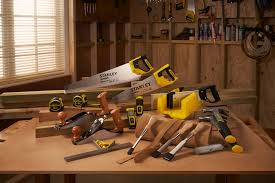Unlocking Potential: The Power of Tools in Everyday Life

The Essential Role of Tools in Our Daily Lives
Tools have been an integral part of human existence since the dawn of civilisation. From the simplest hand tools to the most advanced technological devices, tools play a crucial role in shaping our world and enhancing our capabilities.
One of the key functions of tools is to make tasks easier and more efficient. Whether it’s a hammer for construction work, a computer for data analysis, or a kitchen utensil for cooking, tools enable us to accomplish tasks with greater precision and speed.
Tools also empower us to create and innovate. Artists use brushes and paints to bring their visions to life, engineers utilise complex machinery to build structures, and scientists rely on sophisticated instruments to conduct research. Without tools, many of the advancements that define our society would not have been possible.
Furthermore, tools contribute to our safety and well-being. Medical instruments help diagnose and treat illnesses, safety equipment protects workers in hazardous environments, and navigation tools guide us on our journeys. The reliability and effectiveness of these tools are paramount in ensuring our health and security.
As technology continues to evolve, so do the tools we use. The digital age has brought about a new era of tools that harness the power of computing and connectivity. Smartphones, software applications, and automated systems have revolutionised how we work, communicate, and live.
In conclusion, tools are not just objects; they are enablers of progress and catalysts for innovation. By understanding their importance and harnessing their potential, we can continue to shape a brighter future for generations to come.
Essential Tips for Proper Tool Use and Maintenance
- Always use the right tool for the job to ensure efficiency and safety.
- Regularly inspect your tools for any signs of damage or wear and tear.
- Keep your tools clean and well-maintained to prolong their lifespan.
- Store your tools in a dry and secure place to prevent rust and damage.
- Wear appropriate safety gear, such as goggles and gloves, when using tools.
- Read the manufacturer’s instructions carefully before using a new tool.
- Take breaks during prolonged tool use to prevent strain or injury.
- Invest in quality tools that are durable and reliable for long-term use.
Always use the right tool for the job to ensure efficiency and safety.
It is essential to always use the appropriate tool for a specific task to guarantee both efficiency and safety. By selecting the right tool for the job, you can ensure that the work is completed accurately and in a timely manner. Using the correct tool also minimises the risk of accidents or injuries, as each tool is designed for a particular purpose and using an alternative may compromise safety. Prioritising the use of suitable tools not only enhances productivity but also promotes a secure working environment.
Regularly inspect your tools for any signs of damage or wear and tear.
It is essential to regularly inspect your tools for any signs of damage or wear and tear. By conducting routine checks, you can ensure that your tools are in optimal condition and safe to use. Identifying issues early on allows you to address them promptly, preventing potential accidents and maintaining the efficiency of your tools. Remember, a well-maintained tool not only performs better but also lasts longer, saving you time and money in the long run.
Keep your tools clean and well-maintained to prolong their lifespan.
It is essential to keep your tools clean and well-maintained in order to prolong their lifespan. Regular cleaning helps prevent corrosion and build-up of debris, ensuring that your tools remain in optimal condition for longer periods of time. Proper maintenance, such as lubrication and sharpening, not only enhances their performance but also reduces the risk of wear and tear. By taking care of your tools diligently, you can ensure their longevity and efficiency, saving you time and money in the long run.
Store your tools in a dry and secure place to prevent rust and damage.
It is essential to store your tools in a dry and secure place to protect them from rust and damage. Moisture can cause metal tools to rust, leading to deterioration and reduced effectiveness over time. By keeping your tools in a dry environment, such as a tool chest or cabinet, you can prolong their lifespan and ensure they remain in optimal condition for future use. Additionally, storing tools securely helps prevent accidents and loss, ensuring that your tools are readily available when needed.
Wear appropriate safety gear, such as goggles and gloves, when using tools.
It is crucial to prioritise safety when using tools by wearing appropriate protective gear, such as goggles and gloves. These safety measures serve as a barrier against potential hazards, including flying debris, sharp edges, and chemicals. Goggles shield the eyes from particles and prevent eye injuries, while gloves provide protection against cuts, abrasions, and burns. By donning the necessary safety gear, individuals can mitigate risks and ensure a safer working environment when handling tools.
Read the manufacturer’s instructions carefully before using a new tool.
It is essential to carefully read the manufacturer’s instructions before using a new tool. Understanding the guidelines provided ensures safe and effective usage of the tool, preventing accidents and damage. By following the instructions, users can maximise the tool’s performance and longevity, ultimately enhancing their overall experience and productivity.
Take breaks during prolonged tool use to prevent strain or injury.
It is essential to take breaks when using tools for an extended period to avoid strain or injury. Prolonged use of tools can put a strain on muscles and joints, leading to fatigue and potential injuries. By taking regular breaks, you give your body a chance to rest and recover, reducing the risk of overexertion. Remember that your well-being is paramount, so listen to your body’s signals and take the necessary breaks to ensure safe and comfortable tool usage.
Invest in quality tools that are durable and reliable for long-term use.
When it comes to tools, investing in quality is paramount. Opting for tools that are durable and reliable ensures long-term usability and efficiency. By choosing high-quality tools, you can trust in their performance, withstand rigorous use, and rely on them for various tasks over an extended period. Quality tools not only enhance productivity but also offer peace of mind, knowing that they will consistently deliver excellent results whenever needed.

